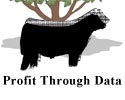|
American Simmental Association
Herdbook Online Services
--handling registrations, transfers, THE, data entry, data lookup

Announcements
* 2025 Fall THE Enrollment is open!
As you gear up for summer projects, don’t forget that the 2025 Fall Total Herd Enrollment (THE) season has begun. Make the most of your planning and preparation by enrolling all your dams in THE—the best tool to support your herd’s success.
Already a current Fall THE herd? Or maybe you’ve read about THE and want to get started?
Now’s the perfect time to take action. Enroll all dams expected to calve between July 1 and December 31, 2025, by the early enrollment deadline—June 15—to lock in the lowest rates. Click on this link for instructions, or check out the tear-out THE instructions in the April issue of Register.
Don't delay, enroll today!
* Spring 2024 THE calf data compliance is in effect as of March 1st!
Each dam enrolled in the 2024 Spring THE season must have a calf reported to her. Calves do not need to be registered. If a dam did not calve, a productivity code, explaining why she did not calve, must be used.
If the reporting requirement has not met as of March 1st, your account will be considered non-compliant and all registrations/transfers will be held until the data is submitted.
Please click on this link for instructions.
* 2024 Year-Letter is "M", 2023 is "L"
In accordance with the Beef Improvement Federation (BIF) guidelines, the year-letter animal identifications are:
-
2023 - L
-
2024 - M
-
2025 - N
-
2026 - P
-
2027 - R
Updates to Be Made to the IGS Growth and Carcass Evaluations
Three evaluations within the IGS genetic evaluation will undergo updates at the end of November. As the IGS genetic evaluation has grown and expanded from historical partners, as well as the addition of new partners, the ability to run genetic evaluations within a week?s time frame has become difficult. One of the main goals of these updates was to increase the efficiency of evaluations; however, these upgrades are also to maintain or improve the accuracy of prediction of each evaluation. To read the full update from the IGS Science Team and to learn more about what can be expected, click here.
Link to: https://www.internationalgeneticsolutions.com/site/#announcements
Hydrops Pregnancies in Simmentals
The Nebraska Bovine Congenital Defects program recently recognized an increased number of reports of hydrops pregnancies in a line of Simmental cows. Hydrops is expressed by females developing markedly enlarged abdomens in late pregnancy due to a dramatic excess fluid in the fetal membranes. At present, these cases point to a genetic link but the pattern of inheritance and percent of affected offspring is unknown. Reports involve daughters and granddaughters of the bull WS All Aboard B80, ASA #2852207. For the most up-to-date information, to report a case, or to watch the informational webinar, please visit https://www.simmental.org/site/index.php/hydrops-pregnancy.
Per the BIF guidelines, the following letters are not used: "I", "O", "Q", & "V".
* Registering an animal of another Breed - Foundation Registration
If you are registering an animal out of a sire of another breed, this sire must be registered in another breed association and then registered with ASA as a foundation animal.
If you are registering an animal out of a cow of another breed that is registered in another breed association, the animal will have a more complete pedigree and EPDs if the cow is registered with ASA as a foundation animal.
There is information on registering foundation animals here.
* Avoid processing delays! Required tests for sires and donor -
All bulls with semen collected and donor cows must have a high density DNA SNP analysis. In addition all sires and donor cows with a carrier in their lineage (CL, DL) or who come from a risk population (PR) for specified genetic defects must be tested for that defect before registration certificates and EPDs are available on new progeny. Please plan ahead; tests can take from 4 to 8 weeks. No testing is required on dams of natural calves. More..
The epd/pedigree display from `Animal Search` shows the genetic status for each animal. The TraitTrac system shows whether animals are tested free, tested carrier, carrier in their lineage, no known carrier in their lineage or from risk population for one or more defects.[more information ..] Click here for frequently asked questions. less..
--------------------Instructions for Herdbook Services -------------------------
-
Log in by choosing that option from options tab in the top bar. Have your member/account number and password available. If you are not a member of the Association, you can create an account from the Log In page to have access to more search features.
-
Registrations, transfers, calf records and THE enrollments can be done under `Data Entry` after log in.
-
Choose Online from `Data Entry` to enter data through the web site. You can preload animals or start with an empty spreadsheet of rows and columns. Each row represents 1 animal and the columns represent specific data on the animal. When you select (click on) a column heading, information about the column is displayed. The tabs immediately above the spreadsheet are used to change the column headings for entering (or viewing) additional data.
-
Choose Download from `Data Entry` to get a form to enter this information off line using Excel to upload at a later time. Choose Upload when the Excel file is complete and data is ready to send to ASA.
-
To display EPD and pedigree information choose `Animal Search` under `Data Search`. Choose `EPD Search` to search the database for animals meeting specified EPD and other criteria.
-
`Reports` under `Herd Mgmt` provides calf crop summaries and more. You can also create you own groups and reports.
-
Please call (406-587-4531) or email simmental@simmgene.com if you have questions or comments.
|